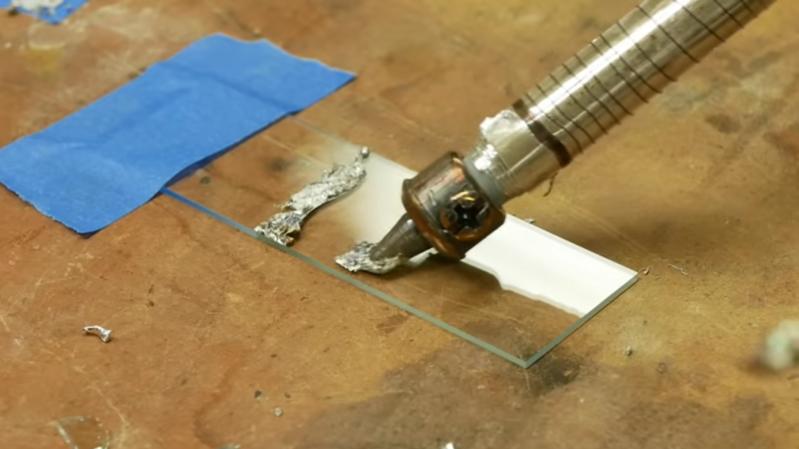Ultrasonic soldering is a little-known technology that allows soldering together a variety of metals and ceramics that would not normally be possible. It requires a special ultrasonic soldering iron and solder that is not cheap or easy to get hold of, so [Ben Krasnow] of [Applied Science] made his own.
Ultrasonic soldering irons heat up like standard irons, but also require an ultrasonic transducer to create bonds to certain surfaces. [Ben] built one by silver soldering a piece of stainless steel rod (as a heat break) between the element of a standard iron and a transducer from an ultrasonic cleaner. He made his special active solder by melting all the ingredients in his vacuum induction furnace. It is similar to lead-free solder, but also contains titanium and small amounts of cerium and gallium. In the video below [Ben] goes into the working details of the technology and does some practical experimentation with various materials.
Ultrasonic soldering is used mainly for electrically bonding metals where clamping is not possible or convenient. The results are also not as neat and clean as with standard solder. We covered another DIY ultrasonic soldering iron before, but it doesn’t look like that one ever did any soldering.
Ultrasonic energy has several interesting mechanical applications that we’ve covered in the past, including ultrasonic cutting and ultrasonic welding.
















soLder has an L in it.
Why do Americans pronounce it as sodder?
Worcester has…
That’s telling ’em!
And Leicester has….
And Aluminum does not have…
Not in US English, but in UK English it does have the other ‘I’.
Which is correct when you compare to the other elements, we (UK) have it wrong with the “I” in. :)
I still do not understand why it is pronounced sardar though. How do Americans pronounce “shoulder”, shardar perhaps?
Wikipedia says: “The form of the place name varied over history, with Early English and subsequent Norman French additions”
Yes, we learned English from the grand masters of Shibboleth.
That tradition still continues in the Middle East
#9: Tissa (Hebrew) Tisha (Arabic)
Left: Smol (Hebrew) Shmol (Arabic)
I dont know, why do the British call a drive shaft a prop shaft. A car is not a boat, a car doesnt have a prop. I just think every culture does wierd things, they dont know why they do them, they just do them because thats what they always done. If it’s not hurting anyone what does it matter.
Aircraft have prop shafts as well.
propel:v:drive, push, or cause to move in a particular direction, typically forward
Surprisingly “American” English has the same meaning
Why do the British pronounce Bestwick (best wick) as Bezzeg?
I could give you an academic answer involving the etymology of names, how the pronunciation of letters changes over time, how the English language is an amalgam of other languages with different ways of sounding out words depending on there origin language but really it’s just to confuse foreigners and those that choose to learn it as a second language
This. You try being on a small island with a couple super-old languages, and then being serially invaded by all of your (friendly) neighbors, all the while taking up their words.
We’ll see how rational your spelling comes out.
They may take our land, but we’ll take their words…
And by the way, what’s a capacitator? It’s especially troubling when they’re found to be baked or fried. I’ve never seen resistitators, or transistitators on the menu. Inductitators? Condensitators? Reluctitators?
Should we discuss Cholmondeley?
The first rule of Chumly is that one doesn’t discuss Chumly.
Probably the same reason that English speakers in many areas don’t pronounce the letter ‘r’ when it is followed by a consonant. Natural language evolved regionally.
It will be interesting (for future generations) to see if it still does or if we all speak the same after several generations grow up with the internet.
Yeah, I was hearing “sod ‘er” all the way through.
Awesome!
So you need a ultrasonic iron to build a ultrasonic iron….
No you don’t.
But you need a vacuum induction furnace and pure silver, cerium, gallium and titanium.
Or a sufficiently convincing corporate entity to request samples from the manufacturers, that’s probably cheaper and easier.
Getting hold of pure Silver, Titanium and Gallium is no problem at all. Cerium is also quite easy to get. If you want, you can extract it out of Zippo lighter flints.
Thanks for the video!